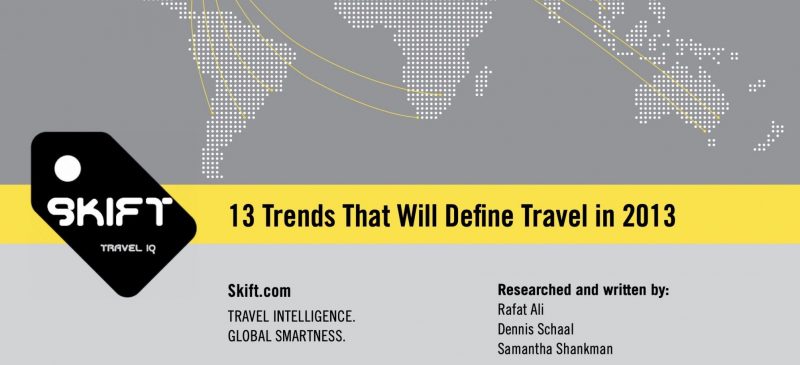In early 2013, five months after Skift’s official launch, we predicted that previous-minute lodge bookings on cell phones would turn into the norm, and that spending fees for ancillary products and services, from checked baggage to spa appointments, would turn out to be next nature.
On the lookout back — Covid notwithstanding — we did a credible task in highlighting our predictions of 13 pertinent journey developments, with some of our forecasts so on stage that currently the things we envisioned in 2013 are now basically taken for granted.
Though we nailed many of the 13 World wide Tendencies That Will Outline Travel in 2013, we skipped the mark on a couple of, and other folks are nuanced or call for even further clarification.

As a grisly Skift veteran who, along with my colleagues close to the environment, is marking Skift’s ninth anniversary Friday, I remember fondly that founder Rafat Ali, reporter Samantha Shankman, and myself researched and wrote the 13 Developments That Will Outline Journey in 2013 from a cramped co-functioning house, AlleyNYC, on 7th Avenue in Manhattan.
Skift was just locating its footing in travel media, and our 2013 prognostications about key vacation tendencies ultimately evolved over the many years into our yearly Megatrends franchise, which pre-Covid involved world-wide events and the magazine.

I have found in excess of the a long time that so numerous other corporations, from media competitors to significant publicly traded online travel companies, have hopped aboard our foreseeable future of journey formulations and posted their very own simply because that is what journey business executives are dying to locate out about.
Around the years, we designed Skift’s core values, and they are the foundation of what energizes our once-a-year Megatrends publication — now a collaboration of the Skift Editorial and Research Departments — about the system of many months on a yearly basis. We didn’t even have a Investigate Section when we issued our initial 13 Developments in 2013.
Among the these core values that gasoline our yearly Megatrends deliberations are: “Always occur up with new methods & perspectives of looking at the entire world,” and “Always, always do our very own issue, without the need of panic.”
That generally guided us and in Skift’s early days we were loved, resented and highly regarded simultaneously. The term “Skift” indicates “shift” or “change” in the Nordic languages, and we were being unafraid of rocking the powers that be in travel media when we arrived on the scene, predicting that we’d grow to be the homepage of the travel industry. Our critics dismissed us at the time, but you decide for your self how that boast turned out.
Of course, when you are earning in some cases-daring and contrarian predictions, we can generally get solace in our mantra, “Fuck it, let’s do it.”
On our ninth anniversary at Skift, we assumed it would make for an attention-grabbing story to appear back again at a handful of of these crucial trends, and see how they turned out.
So the subsequent are feelings on some of the Trends we stood guiding in January 2013.
Absolutely everyone Wishes a Chinese Vacationer — Mostly Right
We gushed that in 2012 that the 1 billion international vacationer milestone had been achieved. By pre-pandemic calendar year 2019, according to the Planet Tourism Group, that number rose 50 p.c to 1.5 billion, and about 155 million of these world wide wanderers have been from China.
Lodges in quite a few places in truth begun stocking Mandarin-language menus and informational packets, and designer clothes shops on the Champs-Élysées began accepting WeChat Pay out and Alipay. So Chinese vacationers, at the time international journey resumes in earnest, could without a doubt after all over again be coveted attendees.
The only caveats we’d elevate are that the entire world has develop into even additional polarized in the interim, and some places coming out of the pandemic are rethinking tourism’s affect on nearby populations.
U.S.-China tensions came to the fore, and China and South Korea had been at loggerheads for a time in excess of deployment of a U.S. missile defense system. These sorts of disputes, short-term or enduring as they may be, provide as a drag on Chinese outbound tourism with vacationers diverted alternatively to closer destinations this kind of as Hong Kong, Macau or Thailand.
Places delicate to overtourism, in individual, could blunt enthusiasm at situations for Chinese and other visitors.
Talking of overtourism, we are happy of some of the conditions more than the several years that Skift both coined or punctuated. Among them are overtourism, loathe-advertising, supertraveler, and permanxiety.
Ancillary Fees Are the New Usual —Bingo, Yes
Indeed, now we reflexively spend — like it or not — expenses on everything from checked luggage to airline seat assignments.
As IdeaWorks wrote in in June 2021: For several airways, revenue from seat assignment gross sales has moved up the earnings statement from a insignificant presence to a robust #2 location. For some, this can be a billion-greenback consequence, and for each and every other airline it’s a multi-million-dollar small business.”
Okay, we didn’t predict the proliferation of hotel resort costs in some geographies, but that fits appropriate into the trend.
Very last-Moment Mobile Resort Reserving — Amen
In 2013, we talked about how HotelTonight was a single-minded and cellular-only app for exact same-day resort bookings. A great deal has adjusted: Acquired by Airbnb in 2019, HotelTonight now has a web site, and you can reserve a space up to 100 days in advance — in addition to that night at 10 p.m.
But as with several other apps, same-working day resort bookings on your phone are a staple of lodge-scheduling now. Other than price and availability questions in the course of major situations, why e-book in advance when you can procrastinate right until later that night time?
The Rise of Selling price Transparency — Of course, But
We reported in 2013 that price tag transparency would come to be the norm. It certainly has come to be a major issue and has activated regulatory motion.
In 2019, adhering to strain from the European Fee and the Norwegian Purchaser Authority, Airbnb starting off exhibiting the full selling price upfront on the initial web page of listings for particular dates — for travelers in Europe. But you will not essentially see the overall value, which include cleansing expenses, in the U.S., for case in point, the place regulation has been somewhat lax.
The European Fee in 2020 similarly pushed Scheduling.com and Expedia to exhibit the complete selling price of accommodations, which include necessary service fees.
But even though there is heightened consideration to the difficulty by some regulators, value transparency continues to be a mess outside the house of Europe, and gotcha fees and the genuine full selling price often appear as unwelcome surprises to travelers.
Foodies Indeed, and Bleisure Vacation Interrupted
We were on the mark when we explained in 2013 that food tourism would grow to be a important matter. Imagine of all the tourists who Instagram-choose their desired locations centered on shots of Hawaiian limited ribs or pork noodles in Malaysia.
The world wide culinary tourism industry was valued at $1,1 trillion in 2019, in accordance to Investigate and Markets, and is expected to access a market value of $1.8 trillion by 2027, registering a compound once-a-year development amount of of 16.8 p.c from 2020 to 2027.
In 2013, we forecast that arbitrary distinctions between business and leisure journey would be muddied in the potential, and bleisure vacation — tacking on some vacationing to your organization trip — would select up momentum, which it did.
Having said that, Covid-19 erased business enterprise vacation in quite a few elements of the environment, but the bleisure pattern will absolutely increase a new in a publish-pandemic entire world.
Electronic Maps as a Critical Battleground — Certainly and No
In the West, Google has undoubtedly turned Google Maps, wherever you can do every thing from sorting your mass transit possibilities to scheduling a spa or hotel, has definitely set the anxiety of god into competition.
But though some take into account Google Maps to be the next prospective superapp, people superapps them selves, from WeChat and Alibaba in China to Get in Singapore, have supplanted maps as bigger battlegrounds for vacation competitiveness.
The Entice of Myanmar — Nope
In 2013, we wrote about the “Lure of the previous unfamiliar: The rise of Myanmar.” Though Myanmar trended as a journey desired destination for awhile, and Myanmar tourism even secured a booth at a Pacific Asia Vacation Association celebration 3 many years in the past in Malaysia, the Myanmar military services crushed any semblance of democracy there, and carried out genocide, reversing the luster of a location that was trending.
Hey, as we mark Skift’s 9th anniversary on July 30, 2021, in a environment that is nevertheless currently being ravaged my Covid-19 nearly two a long time into the pandemic, we are by now sport-setting up our Megatrends forecasts for up coming 12 months.
If the previous is a predictor of the upcoming, we’ll be daring in our Megatrends predictions, and we’ll do so without the need of fear.
Founding and Government Editor Dennis Schaal was technically Skift personnel No. 1, hired by Founder Rafat Ali and Co-Founder Jason Clampet. So he has celebrated all nine anniversaries.
Editor’s Note: The lead image for this tale was taken by Skift Founder Rafat Ali in the Mongolian desert, aspect of his solo globe travels prior to launching Skift.
Image Credit score: The Mongolian desert. Rafat Ali / Skift

